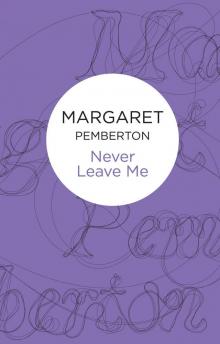- Home
- Margaret Pemberton
The Londoners
The Londoners Read online
For my daughter, Rebecca May.
A South London girl.
Contents
Chapter One
Chapter Two
Chapter Three
Chapter Four
Chapter Five
Chapter Six
Chapter Seven
Chapter Eight
Chapter Nine
Chapter Ten
Chapter Eleven
Chapter Twelve
Chapter Thirteen
Chapter Fourteen
Chapter Fifteen
Chapter Sixteen
Chapter Seventeen
Chapter Eighteen
Chapter Nineteen
Chapter Twenty
Chapter Twenty-One
Chapter Twenty-Two
Magnolia Square
Chapter One
About the Author
Also by Margaret Pemberton
Acknowledgements
Chapter One
JULY 1933
‘Freedom!’ Kate Voigt said exultantly, raising her face to the hot afternoon sun. ‘Doesn’t it feel wonderful?’
Carrie Jennings swung an empty, much-battered school-satchel round and round in a huge arc. ‘It feels blissful,’ she agreed in deep contentment, tempted to let go of the satchel and send it spinning into the stratosphere. ‘No more boring old uniform, no more tedious lessons!’
Kate grinned. ‘There may be no more lessons for you, but there’s going to be lots more lessons for me. The principal at the secretarial school said that shorthand was almost as difficult as algebra.’
‘Then why study it?’ Carrie asked sensibly, shuddering at the memory of past maths lessons and deeply grateful that she would never have to sit through another one. ‘Why don’t you tell your dad you don’t want to go to secretarial school? Why don’t you tell him you want to work down the market with me?’
‘Because I don’t,’ Kate said with the candour that was an honourable rule between them. ‘I don’t have the voice for it and besides, I couldn’t stand the cold in winter. Do you remember your mum last December? She had so many layers of clothing on her that when she came home it took her an hour to struggle out of them and she was still half-perished.’
‘There’s the summer though,’ Carrie said philosophically as they neared the end of the street in which Blackheath & Kidbrooke School was situated and stepped out on to the Heath. ‘I’d much rather be down the market in summer than stuck in a stuffy office banging away on a typewriter.’
It was summer now and as Kate looked across the glory of the gorse-covered Heath towards the distant spire of All Saints’ Church and the higgledy-piggledy grey and red roofs of Blackheath Village she couldn’t help but agree that Carrie had a point. It was a very minor point though. Much as she enjoyed occasional Saturday work helping Carrie on her father’s market stall, she didn’t have the market in her blood and bones as Carrie did.
She knew, also, that the real work wasn’t weighing out fruit and vegetables and exchanging light-hearted banter with customers. It was trawling up to Covent Garden before dawn to buy in produce and ferrying it back down the Old Kent Road to Lewisham Market by horse and cart hours before more conventional workers were even considering getting out of their beds. The very thought made her shudder in exactly the same way Carrie had shuddered at the memory of maths lessons.
‘Even if I wanted to work in the market, Dad wouldn’t let me,’ she said truthfully as they walked over springy, coarse grass towards the south-west corner of the Heath. ‘He still isn’t happy about me doing Saturday work there and if it wasn’t that I was working for your dad he wouldn’t allow it at all.’
‘That’s ’cos he’s a teacher,’ Carrie said, unconcerned. ‘All teachers think market trading common.’
A slight frown creased Kate’s forehead. It was true that her father didn’t have an overly high opinion of market trading as a profession, but he certainly didn’t think Carrie’s family common and she didn’t want Carrie thinking that he did.
‘My dad has a very high opinion of your family,’ she said firmly. ‘He was ever so pleased when your dad joined the pub’s cricket team. He says he’s the best bowler they’ve ever had.’
Carrie grinned. ‘It comes of years of practice lobbing oranges and grapefruits. Are you going on the pub outing to Folkestone? It’ll be fun. Especially if the non-cricketers get up a side to play the cricket team on the beach like they did last year.’
‘And especially if your gran takes her whippet with her again,’ Kate said, giggling. ‘He caught more balls than Dad did.’
They skirted an old gravel pit thick with gorse and Carrie said, ‘Talking of Gran, why don’t you celebrate school being finally over by staying for tea today? It’ll be bean and barley soup,’ she added temptingly. ‘And fish.’
‘I can’t, Carrie. I’ve Dad’s dinner to get ready.’ There was genuine regret in her voice. Carrie’s Jewish grandmother was an absolute whizz in the kitchen and the mere thought of her home-made soup was mouth-watering.
‘He won’t be home for another couple of hours,’ Carrie persisted. ‘You know he never leaves school till after six. You can eat with us and still be home in time to put his dinner on the table.’
The temptation was too great to resist and Kate no longer tried. ‘I’ll have to be home by six, though,’ she warned as they crossed the road flanking the Heath, catching a distant glimpse of the Thames as they did.
‘That’s OK,’ Carrie said easily. ‘It’ll give Gran plenty of time to find out what’s happening in your life and to give an unasked opinion of it.’
Giggling, they turned, still arm in arm, into the short road leading into Magnolia Square. The spacious Square, named after the magnolia trees that grew in several of its gardens, had seen better days but its large Edwardian houses still retained an air of genteel dignity, a dignity that was enhanced by St Mark’s Church, the small, eighteenth-century church the Square had been built around.
The short road leading into the Square from the Heath was Magnolia Terrace; the road leading out of it, Magnolia Hill. Lined with terrace houses, it curved steeply down towards Lewisham and its busy High Street, ensuring that the southern, less smart half of the Square was known as ‘the Lewisham half’ while the other half, with St Mark’s Vicarage lording it on the north-east corner, was known more grandly as ‘the Heath half’.
Kate and her widowed father lived on the west-hand side of ‘the Heath half’ and the Jennings family lived on the southern side of ‘the Lewisham half’ in a house abutting the west-hand corner with Magnolia Hill.
As they walked towards it, they walked past the bottom of Kate’s garden and her elderly next-door neighbour said to her, pausing in her task of trimming her hedge, ‘Good afternoon, Katherine.’
‘Good afternoon, Miss Godfrey,’ Kate responded guardedly. Miss Godfrey, though now long retired, had been headmistress of their primary school and, in Kate’s and Carrie’s opinion, took far too much of an interest in their lives.
‘Arternoon, Miss,’ Carrie said with provocative carelessness.
Miss Godfrey paused in her task. ‘The word is after-noon, Caroline. Sloppy speech leads to sloppy thinking.’
Carrie bridled. ‘Not dahn the market it don’t,’ she said, allowing her speech to slip even further. ‘And dahn the market any other kind o’ speech ’ud be a right ’andicap.’
Miss Godfrey clicked her tongue in annoyance. Ever since she had been a little girl Carrie Jennings had enjoyed having the last word and it was a trait adolescence hadn’t improved.
‘The ability to speak good English is a great asset in life, Caroline,’ she said reprovingly. ‘And it is something we can all attain. When Katherine’s father first found himself in Engla
nd he couldn’t speak a word of English. Now his English is perfect.’
She made it sound as if Kate’s father were one of her ex-pupils and Kate suppressed a spurt of indignation, saying stiffly, ‘There’s no need to skirt the issue of how Dad came to be resident in England. Everyone knows he was a prisoner-of-war. And his English isn’t perfect. He speaks it with a German accent.’
‘And my Dad speaks it with a Cockney accent,’ Carrie added cheekily.
Miss Godfrey ignored her. ‘I was not skirting the issue of how your father came to be resident in this country, Katherine,’ she said, a slightly troubled expression entering her eyes. ‘I was bearing in mind the revulsion the new German Chancellor’s Nazi policies have aroused and the consequent tide of British ill feeling against Germany and was merely being tactful.’
Kate stared at her, bewildered. ‘I’m sorry, Miss Godfrey. I don’t understand the connection. My father isn’t a sympathizer of Mr Hitler. He never even visits Germany . . .’
Carrie, sensing that Kate and Miss Godfrey were on the verge of a discussion that would be as long as it would be tedious, tugged her arm, saying impatiently, ‘Come on, Kate. If we don’t get a move on you won’t have time to stay to tea.’
Miss Godfrey, too, had no desire to continue the discussion. Through her own carelessness it had veered on to a subject too delicate to be pursued in the street, as if of no more importance than the latest Test Match score or the weather.
‘We’ll talk further another time, Katherine,’ she said, for once grateful to Carrie for having interrupted a conversation that was nothing to do with her. ‘Goodbye, Caroline. Give my regards to your mother.’
As Kate and Carrie walked away from her, she stood for a long moment, her shears motionless over her privet, watching them. Even from the rear they made a handsomely distinctive pair. Both of them were tall and slender, though there was an underlying robustness about Carrie that indicated it was a slenderness she would soon outgrow. Where Carrie’s untidy dark hair was held away from her face by combs, Kate’s pale-gold hair was constrained in a single, thick, waist-length plait. It was a neat, sensible hairstyle and on any other girl Miss Godfrey would have approved of it. She didn’t, however, approve of it on Kate. In her opinion, it made Kate look far too Teutonic.
Her frown deepened. Carl Voigt taught German at a local boys’ Grammar School and was highly intelligent. Surely he was aware that in the present political climate it wasn’t sensible to draw attention to his daughter’s ancestry? Why, only that morning the Daily Telegraph had carried the most appalling report of the way Jews were being hounded in Germany, rounded up and sent to concentration camps on charges so flimsy they would be laughed out of any civilized court of law.
With a heavy sigh she once more began to clip her hedge. What with godlessness raging in a country that had been the cradle of Protestantism, anarchy spreading like a forest fire throughout Spain and Mussolini behaving like a madman in Italy, the world was becoming a very uncertain place. Almost as uncertain as it had been in the spring of 1914. Remembering how, when war had broken out in the summer of that year, many German traders in London had had their shop windows smashed by Kaiser-hating neighbours who had once been their friends and customers, Miss Godfrey resolved to have a tactful word with Carl Voigt. If he was blind to the ugliness inherent in human nature when arrant jingoism was let loose, she wasn’t. And to be warned was to be forearmed.
‘Silly old bat,’ Carrie said dismissively the minute they were out of Miss Godfrey’s hearing. ‘Why does she make such a song and dance over everything? Do you think now I’ve left school Mum will let me have my hair permed and would you cut it for me and come with me to the hairdressers when I go?’
‘I would, but not willingly,’ Kate said, her mind still on Miss Godfrey’s peculiar remarks. ‘What if it makes your hair frizzy? Even worse, what if it falls out?’
Carrie giggled, ‘Or turns my hair green? That would be a laugh, wouldn’t it. Mum would have ten fits.’
All the houses in the Square had a short flight of broad, shallow stone steps leading up to their front doors and in the summer many residents sat out on them in order to enjoy the sun and to survey the comings and goings of their neighbours. As a consequence, Kate’s and Carrie’s conversation was punctuated every few yards by the necessity of returning greetings and answering questions about their general welfare.
‘I’m very well thank you, Mr Nibbs,’ Kate called out now in answer to a middle-aged, stocky man’s enquiry. ‘And you’re right. Today was my last day at Blackheath & Kidbrooke. I’m starting secretarial school in September.’
Mr Nibbs, proprietor of Nibbs High Class Fruit and Vegetables, Blackheath Village, and enjoying his weekly half-closing day, grinned. ‘When I want a secretary then I’ll know where to come,’ he said jovially.
As they continued to walk towards the bottom end of the Square, Carrie said in high amusement, ‘You note he didn’t speak to me? He regards my dad as his arch-enemy. Not surprising when you consider the amount of trade Dad manages to take away from him. Now about my hair. Do you think if . . .’
‘You goin’ to babysit for me tonight, Carrie?’ A buxom young woman called as she sat shelling peas on the top step of a house on the Square’s southern side, a house far shabbier than any of the previous houses. ‘Ted’s in the darts championship an’ he wants me there to cheer ’im on.’
‘An’ wot if I said I wasn’t?’ Carrie shouted back in like manner. ‘Would it make any difference?’
Carrie’s elder sister grinned, ‘Not an ’a’p’orth. I’ll see you seven, sharp.’
‘Bloomin’ cheek,’ Carrie said crossly as they continued on their way. ‘I hate babysitting for Mavis. She never has Billy in bed. When I babysat last Wednesday she hadn’t even fed him.’
Kate, who had no family in the world apart from her father and was deeply envious of Carrie’s warm-hearted, if slip-shod, extended family, said placatingly, ‘I bet she left you money for fish and chips though.’
With bad grace Carrie admitted that Mavis had, indeed, left money for fish and chips and money for a bottle of ginger beer also.
‘It’s still a flippin’ liberty,’ she said as they turned in through the next gateway. ‘Why should I be the one to go tramping down to the fish shop?’
‘Why complain?’ There was mischief in Kate’s black-lashed blue eyes. ‘It gives you a chance to look over the local talent, doesn’t it?’
‘If you mean the gang that hangs around the chippie you’ve got to be joking,’ Carrie said without too much sincerity. ‘Danny Collins was there last Wednesday, flaunting off his new army uniform. If that’s the kind of reject the army are taking God help us if there’s ever another war. We’ll stand no chance!’
Her momentary flare of bad humour vanquished, she giggled as she opened a front door almost bare of paint. ‘The Robson boys were there as well, full of how they’re going to follow in Danny’s footsteps only to hear them, they’re going to be Marines!’
Jack and Jerry Robsons’ widowed father, Charlie, was the acknowledged local villain and Kate said dryly, ‘It’ll be better than them following in their father’s footsteps and ending up in prison!’
As Carrie hooted in laughter her gran called out from the kitchen, ‘Carrie? Is that you already? Who do you have with you? Half the street?’
‘No, Gran,’ Carrie said, throwing her hated and now defunct school blazer over the first chair she came to. ‘Only Kate. She’s staying for tea.’
Leah Singer came barrelling out into the narrow hallway, a capacious apron tied around her ample waist, her blouse sleeves pushed high above her elbows, an uncommonly plump whippet at her heels. ‘Kate! It’s a brocheh to see you! How are you?’
‘I’m fine thank you, Mrs Singer,’ Kate said, sidestepping the dog and shrugging her arms out of her blazer and looking in vain for somewhere to hang it.
Carrie relieved her of the trouble by taking it from her and flinging it over a nearby cl
othes-horse full of airing ironing.
‘Then come into the kitchen and get some good food inside you,’ Leah said, beaming. ‘I’ve got a bissel of the best fried plaice you’ve ever tasted. Don’t stand there like a nebbish, Carrie. Wash your hands and sit down at the table.’
They followed her back into the kitchen and Kate felt the rosy glow of well-being that always suffused her whenever she entered the large room that, thanks to Leah Singer’s industry, was the heart of the Jennings’ home. Exotic packets of dried foodstuffs crammed the open shelves beside the stone sink. A large smoked sausage hung enticingly from a hook in the ceiling. On the baking board covering the boiler was a pile of still oven-warm bagels with rich golden-brown crusts and on the kitchen range the contents of a frying pan sizzled, while beside it a pan of soup simmered, filling the room with a mouth-watering aroma.
‘So, you’re big girls now?’ Leah asked rhetorically as she began ladling the soup into bowls and they washed their hands with hard pink soap. ‘No more school? No more homework?’
‘Kate will probably still have homework,’ Carrie said, drying her hands on an off-cut of towelling hooked under the sink. ‘She’s going to secretarial school in September.’
Leah handed her the soup bowl and drew in an admiring breath. ‘Secretarial school! That’s what you should be doing Carrie, my girl. Better sitting in a fine office than shouting and touting like a fishwife in Lewisham High Street.’
‘I’m like my dad,’ Carrie said equably as she sat down at a deal table scrubbed almost white, ‘I like shouting and touting.’
Leah, never reticent about voicing her disappointment in either Carrie’s father’s non-Jewishness or his occupation, merely clicked her tongue in exasperation much as Miss Godfrey had done only a little while earlier.
‘You could do so much better for yourself, bubbehh,’ she said, following Kate to the table and sitting down next to her. ‘Typing, sewing, hairdressing. Anything but the market.’
‘I don’t have the patience to learn to type,’ Carrie said truthfully, ‘and besides, even if I did, nothing I ever typed would be spelt right. As for sewing and hairdressing, I’m a klutz in both departments, which is why Kate’s going to come round at the weekend to cut my hair so that I can have it permed.’

 The Summer Queen
The Summer Queen Moonflower Madness
Moonflower Madness The Londoners
The Londoners The Flower Garden
The Flower Garden Yorkshire Rose
Yorkshire Rose Vengeance in the Sun
Vengeance in the Sun Zadruga
Zadruga Beneath the Cypress Tree
Beneath the Cypress Tree Magnolia Square
Magnolia Square Party in Peking
Party in Peking Lion of Languedoc
Lion of Languedoc Forget-Me-Not Bride
Forget-Me-Not Bride The Guilty Secret
The Guilty Secret Rendezvous With Danger
Rendezvous With Danger A Season of Secrets
A Season of Secrets Silver Shadows, Golden Dreams
Silver Shadows, Golden Dreams The Four of Us
The Four of Us Devil's Palace
Devil's Palace Never Leave Me
Never Leave Me An Embarrassment of Riches
An Embarrassment of Riches African Enchantment
African Enchantment White Christmas in Saigon
White Christmas in Saigon Coronation Summer
Coronation Summer A Multitude of Sins
A Multitude of Sins Tapestry of Fear
Tapestry of Fear A Many-Splendoured Thing
A Many-Splendoured Thing